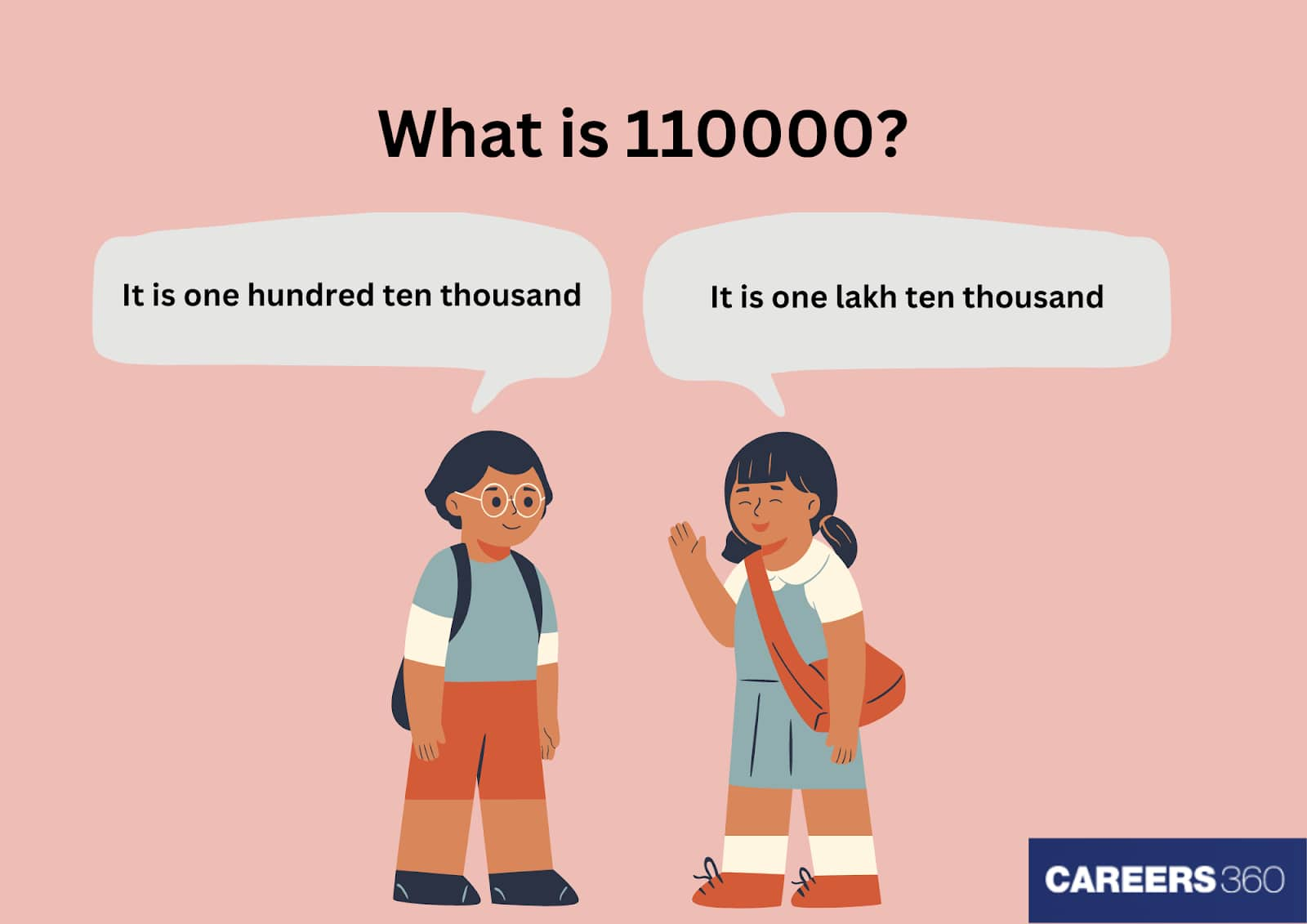110000 in Words
Introduction
If we want to pronounce 110000 aloud, we would say either “one hundred ten thousand” or “one lakh ten thousand”. 110000 is written as “one hundred ten thousand” in the international number system, while “one lakh ten thousand” means 110000 in the Indian number system.

About The Number 110000
110000 is a six-digit natural number. Natural numbers are those numbers that start from 1 to infinite. In the number system, 1, 2, 3, …, and up to 9 are one-digit natural numbers, while 10, 34, 156, 1078, etc., are natural numbers with more than one digit. Therefore, we can say that 110000 is also a natural number.

110000 is an even number. Let us divide a number by 2, if we get one as the remainder, the number is odd. On the other hand, if the remainder is zero, then the number is an even number. 1, 3, 5, 7, 9, 11, etc., are examples of odd numbers, while 2, 4, 6, 8, 10, 12, etc., are examples of even numbers.
110000 is a composite number. A composite number gives zero as the remainder when divided by another number apart from 1 and itself. For example, 8 can be divided by 1, itself (8), 2, and 4 such that the remainder will be zero. Thus, 110000 is also a composite number.
Place Value Of 110000
The place value tells us the digit's position in a number. For example, the digits ‘1’, ‘8’, and ‘4’ have different positions in the number 184. Thus, they have different place values. In the following example, ‘1’ has the place value of ‘1✖ hundred’, ‘8’ has the place value of ‘8 ✖ ten’, while the place value of ‘4’ is ‘4 ✖ one’.
If we go for more than three digits, we have a thousand and ten thousand for four and five digits, respectively. But, for Indian and International Number Systems, we have different notations for more digits in a number as described in the table below:
Number of Digits | 1 | 2 | 3 | 4 | 5 | 6 | 7 |
Indian Number System | One 1 | Ten 10 | Hundred 100 | Thousand 1000 | Ten Thousand 10000 | Lakhs 100000 | Ten Lakhs 1000000 |
International Number System | One 1 | Ten 10 | Hundred 100 | Thousand 1000 | Ten Thousand 10000 | Hundred Thousand 100000 | Million 1000000 |
The digits 1, 1, 0, 0, 0, and 0 in 110000 are at which position in the place value table for the Indian and International number system is given below.

110000 in Indian Number System | One 0 | Ten 0 | Hundred 0 | Thousand 0 | Ten Thousand 1 | Lakhs 1 |
110000 in International Number System | One 0 | Ten 0 | Hundred 0 | Thousand 0 | Ten Thousand 1 | Hundred Thousand 1 |
Writing 110000 In Words
The number 110000 can be written in words according to the place values of Indian and the International Number systems mentioned in the above tables.
In the Indian Number System, ‘1’ is in the ‘lakh’ place, another ‘1’ is in the ‘ten thousand’ place, ‘0s’ are in the ‘thousand’, ‘hundred’, ‘ten’, and ‘one’ places from left to right. Therefore, the expansion of the number in the Indian number system is:
\begin{aligned}
&1 \times \text { Lakh }+1 \times \text { Ten thousand }+0 \times \text { Thousand }+0 \times \text { Hundred }+0 \times \text { Ten }+0 \times \text { One } \\
&=1 \times \text { 100000 } + 1 \times 10000+0 \times 1000+0 \times 100+0 \times 10+0 \times 1 \\
&=110000 \\
&=\text { One Lakh Ten thousand }
\end{aligned}

In the International Number System, we have ‘1’ in the ‘hundred thousand’ place, ‘1’ in the ‘ten thousand’ place. While ‘thousand’, ‘hundred’, ‘ten’, and ‘one’ places are taken up by the digit zero, from left to right. Therefore, the expansion of the number in the International Number System is:
\begin{aligned}
&1 \times \text { Hundred thousand }+1 \times \text { Ten thousand }+0 \times \text { Thousand }+0 \times \text { Hundred }+0 \times \text { Ten }+0 \times \text { One } \\
&=1 \times \text { 100000 } + 1 \times 10000+0 \times 1000+0 \times 100+0 \times 10+0 \times 1 \\
&=110000 \\
&=\text { One Hundred Ten thousand }
\end{aligned}

You can find out the detailed other number in words article list below:-
Frequently Asked Questions (FAQs)
A prime number is a number that has only two factors, one and itself. 110000 is not a prime number.
An odd number gives 1 as the remainder when divided by 2. 110000 is not an odd number.
No, 110000 is not a perfect square
No, 110000 is not a perfect cube.
Yes, 110000 is divisible by 11. When we divide 110000 by 11, the remainder will be zero.
Applications for Admissions are open.
As per latest syllabus. Physics formulas, equations, & laws of class 11 & 12th chapters
JEE Main Important Chemistry formulas
Get nowAs per latest syllabus. Chemistry formulas, equations, & laws of class 11 & 12th chapters
JEE Main high scoring chapters and topics
Get nowAs per latest 2024 syllabus. Study 40% syllabus and score upto 100% marks in JEE
JEE Main Important Mathematics Formulas
Get nowAs per latest syllabus. Maths formulas, equations, & theorems of class 11 & 12th chapters
